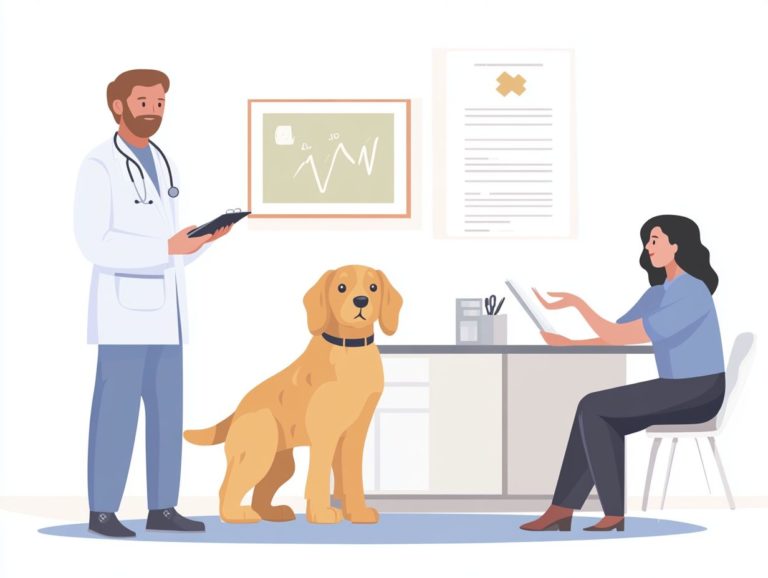The Impact of Stress on Your Pet’s Health
Stress is not exclusive to humans; your furry companions experience it as well. Understanding pet stress is crucial for their well-being.
Recognizing how stress impacts pets is essential for their overall health. This article discusses the physiological responses pets exhibit under stress, identifies common triggers, and highlights signs that may indicate your pet is feeling overwhelmed.
It also offers effective strategies to manage and alleviate stress, emphasizing the importance of mental health in nurturing a happy, balanced life for your cherished companion while considering their physical examination and behavioral history.
Contents
- Key Takeaways:
- The Effects of Stress on Pets
- Common Stressors for Pets
- Signs of Stress in Pets
- Managing and Reducing Stress in Pets
- The Importance of Mental Health for Pets
- Supporting Your Pet’s Mental Health!
- Frequently Asked Questions
- What is considered stress in pets and how does it affect their health?
- How can I tell if my pet is experiencing stress?
- What Can I Do to Reduce Stress in My Pet?
- Can stress lead to long-term health problems in pets?
- Are certain pets more prone to stress than others?
- Is it possible for my pet to pick up on my own stress and mirror it?
Key Takeaways:

- Stress can significantly impact your pet’s health, both physically and mentally, leading to various stress-related health issues.
- Knowing common stressors, such as changes in routine and environmental modifications, as well as signs of stress in pets, helps you identify and manage triggers.
- Nurturing a happy and stress-free environment is crucial for supporting your pet’s mental health and overall well-being.
The Effects of Stress on Pets
Understanding the impact of stress on your pets is vital. Ongoing stress can lead to a variety of stress-related ailments. Dogs and cats, in particular, experience heightened stress levels due to numerous factors, affecting their mental well-being and overall health.
When the body s stress hormone, cortisol, rises, the immune system can become compromised, leading to serious health issues like heart disease and digestive disturbances. You must act now to manage their stress levels for their health!
Understanding the Physiological Response
The physiological response to stress in your pets involves a notable release of cortisol. This hormone significantly impacts their overall health and immune system functionality.
When your pets face stressors, like loud thunder or changes in their surroundings, their bodies react by increasing cortisol production, gearing them up to confront perceived threats. Short bursts of this hormone can be useful, but ongoing elevation from persistent stress can weaken their immune system, making them more vulnerable to infections and illnesses.
Over time, continuous stress can evolve into anxiety disorders, such as separation anxiety or generalized anxiety disorder. This can lead to behaviors like excessive barking, destructive chewing, or withdrawal.
By understanding triggers and managing stress levels, you can greatly enhance your pet s physical and emotional well-being.
Common Stressors for Pets
Identifying common stressors is important for you as a pet owner to effectively reduce your pet’s stress. Your pets can experience stress from various sources, including environmental factors, changes in their routine, and social interactions.
By recognizing these triggers, you can create a more harmonious environment that promotes their well-being.
Identifying Triggers and Causes
Identifying the triggers and causes of stress in your pets is crucial for effective stress management. This can significantly improve their quality of life.
By paying attention to different environmental factors and emotional cues, you can gain valuable insights into what might be causing your furry companions to feel anxious or overwhelmed. Common stressors often include loud noises, such as thunder or fireworks, as well as changes in the household, like moving to a new home or welcoming new family members.
To tackle these challenges effectively, incorporating thoughtful pet care practices is essential. Regular behavioral observations, providing a safe space, and utilizing calming products can make a world of difference. Without proper management, your pets may display common behavioral issues, like excessive barking, which can further heighten their stress and perpetuate a cycle of anxiety.
Signs of Stress in Pets

Recognizing the signs of stress in pets is essential for you as a pet owner. These indicators can manifest both behaviorally and physically, revealing underlying issues related to their stress levels and overall well-being.
Being attuned to these signals gives you the power to address your pet s needs effectively. This ultimately fosters a healthier and happier environment for them.
Behavioral and Physical Indicators
Behavioral and physical indicators of stress in your pets can show themselves in various ways. You might notice shifts in eating habits, heightened anxiety, and withdrawal from social interactions.
If you notice your pet pacing back and forth, excessive grooming that leads to bald patches, or abrupt changes in their appetite, these can signal underlying distress. Such symptoms indicate immediate discomfort and potential long-term implications for their overall wellness.
For example, a lack of appetite could result in nutritional deficiencies, while increased anxiety may lead to behavioral issues.
Recognizing these signs early is essential. Timely intervention can significantly alleviate stress, enhancing your pet’s quality of life and promoting a more harmonious living environment at home and in social situations. This emphasizes the importance of social support for pets.
Managing and Reducing Stress in Pets
Managing and reducing stress in your pets calls for a well-thought-out plan. Begin by pinpointing the specific stressors affecting them. Then, incorporate calming techniques that suit their individual needs.
Consider consulting a veterinary behaviorist, a specialist who helps pets manage their behavior. They can craft a tailored treatment plan designed specifically for your beloved companion.
This comprehensive approach ensures that your pet can enjoy a serene and balanced life.
Effective Techniques and Strategies
Effective techniques and strategies for relieving stress in pets encompass a variety of calming methods, behavioral conditioning, and the importance of proper socialization.
These approaches can be tailored to fit the unique personalities and lifestyles of your pets, enhancing their emotional skills and overall wellness. For example, therapy dogs can provide invaluable companionship and emotional support, helping to alleviate anxiety in both dogs and cats.
Behavioral conditioning, which involves training pets through rewards, helps them cope with stress. Engaging social interactions such as playdates with other animals or structured outings can greatly enhance your pet s emotional well-being.
By keenly observing and understanding your pets’ individual responses, you can implement these strategies effectively. This creates a calmer, more enriching environment for your beloved companions.
The Importance of Mental Health for Pets
The significance of mental health for pets cannot be overstated. Stress profoundly influences their overall well-being, affecting not only their physical health but also their relationships and the invaluable bond they share with you.
Prioritizing your pet s mental wellness is essential for nurturing a harmonious coexistence and enriching both your lives.
The Link Between Stress and Overall Well-being

The connection between stress and your pet’s overall well-being is clear: Elevated stress levels can lead to a host of health problems, undermining their immune system and heightening the risk of anxiety disorders.
Chronic stress can cause behavioral problems, stomach issues, and heart disease. These conditions can significantly impact their quality of life. This added health strain not only affects your beloved companion but can also create emotional distress for you as their owner.
By incorporating effective stress management strategies like establishing a consistent routine, creating a tranquil environment, and ensuring regular physical activity you can help your furry friend feel secure and relaxed.
These changes not only boost their immune function but also set the stage for a happier, healthier life. This allows both you and your pet to share more meaningful moments together.
Supporting Your Pet’s Mental Health!
Supporting your pet’s mental health is crucial. It enhances their quality of life and helps them thrive within the dynamics of pet ownership. One of the most effective strategies to achieve this is by cultivating a nurturing, stress-free environment tailored to their needs.
Nurturing a Happy and Stress-free Environment
Nurturing a happy and stress-free environment for your pets begins with thoughtful environmental modifications, encouraging good social interactions, and establishing a routine that caters to their unique needs.
By introducing safe spaces throughout your home like cozy corners or designated quiet areas you create retreats where your pets can escape when they feel overwhelmed. These spaces help your pets relax and promote tranquility.
Encouraging regular socialization practices, such as introducing your pets to new friends or engaging them in group activities, can significantly alleviate anxiety and enhance their social skills.
Consistent routines, including regular feeding times, stress management, and exercise schedules, instill a sense of security that reduces uncertainty for your pets.
These considerate modifications elevate their emotional well-being and contribute to their overall health and pet wellness, ensuring they thrive in their environments with ease and joy.
Frequently Asked Questions
What is considered stress in pets and how does it affect their health?
Stress in pets can be caused by various factors such as changes in routine, loud noises, or separation from their owners. It can weaken their immune system and increase cortisol levels a hormone that increases when pets are stressed causing digestive issues and raising their risk for illnesses.
How can I tell if my pet is experiencing stress?

Signs of stress in pets can include changes in appetite, behavior, and activity levels. They may also show physical symptoms such as excessive shedding, diarrhea, or skin irritation.
What Can I Do to Reduce Stress in My Pet?
Providing a stable and predictable routine, creating a safe and comfortable environment, and engaging in regular exercise and playtime, along with calming techniques, can help reduce stress in pets. Don t hesitate to reach out to a veterinarian or animal behaviorist for personalized advice!
Can stress lead to long-term health problems in pets?
Yes, chronic stress in pets can lead to various health issues, including heart disease, diabetes, and stress-related illnesses. It can worsen existing conditions and weaken their overall health.
Are certain pets more prone to stress than others?
Just like humans, every pet has a unique personality and may respond differently to stress. Some breeds or individual animals may be more sensitive or predisposed to stress, necessitating specialized veterinary care and extra attention and support.
Is it possible for my pet to pick up on my own stress and mirror it?
Yes, pets can sense their owner’s emotions and may mirror them. If you are experiencing stress, it is important to try to remain calm and provide emotional support and a sense of security for your pet. This can help prevent them from becoming stressed as well.






